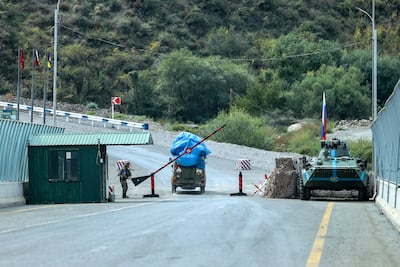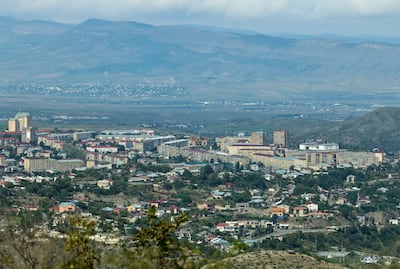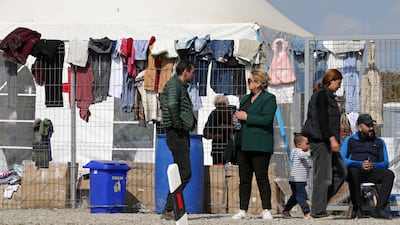UN inspectors in Nagorno-Karabakh say as few as 50 ethnic Armenians may remain in the region as an Azerbaijani diplomat told The National that nobody is being forced to leave.
Elin Suleymanov, Azerbaijan’s ambassador in London, on Tuesday welcomed the UN mission’s report that there was no sign of civilians being harmed or damage to schools or hospitals during the recent fighting.
Armenia, though, said hundreds had been injured as a result of the lightning two-day offensive in which Azerbaijan seized control of the territory and forced a separatist, ethnically Armenian government to disband.
Russian peacekeepers are patrolling the area as a wounded Armenia considers whether to cut ties with Moscow. After losing the struggle for Nagorno-Karabakh, it now faces a refugee crisis due to the exodus of 100,000 people.
The UN inspectors said it was “difficult to determine” whether the refugees intended to return to Nagorno-Karabakh, which Azerbaijan intends to integrate as a full part of its territory.
They said people had left their homes in sudden journeys that “must have caused suffering”, leaving only 50 to 1,000 ethnic Armenians still there. However, the delegation “did not come across any reports” of violence against civilians.
Ethnic cleansing claims
Mr Suleymanov denied Armenia’s claims that the evacuation amounted to ethnic cleansing, saying people had chosen to leave because of a “lack of trust” after more than 30 years of conflict.
“Ethnic cleansing is when you’re forced to leave, when people come to you and say you have to leave,” he said. “We do not force anybody out. In fact, we clearly say that we prefer for them to stay.
“I understand they feel unsafe, they feel uncertain, they feel insecure. That’s a legacy of the conflict, which lasted for 30 years. That is understandable and that’s not what we want. That’s unfortunate. But what can we possibly do? We can’t force them to stay.”

Armenia, meanwhile, says people were “forcibly displaced” from Nagorno-Karabakh, the subject of two wars that ended in ceasefires in 1994 and 2020, because they faced an “existential threat”.
Foreign Minister Ararat Mirzoyan told diplomats the mass migration “clearly amounts to ethnic cleansing as defined internationally”. He said there were “hundreds of casualties and wounded” after the fighting.
Those displaced include women, children and the elderly and Armenia is drawing up a list of “urgent needs” such as accommodation and health care, Mr Mirzoyan said.
The UN mission, the first in the region for 30 years, said it saw no damage to hospitals, schools and housing nor to cultural and religious structures. It did not observe any damage to farmland but said its access to rural areas was limited.
Russia and Azerbaijan have reported sniper fire and the presence of landmines in Nagorno-Karabakh, meaning the situation remains volatile. Armenia said a serviceman was killed near the border with Azerbaijan.
Moscow deployed peacekeepers to the region under a 2020 peace deal but refused to intervene during the rout on September 19, leaving Armenia considering whether to turn its back on its traditional ally.
Armenia's Parliament is expected to vote on Wednesday on whether to join the International Criminal Court, a move that would inevitably enrage the Kremlin given its investigations into Russian President Vladimir Putin.

Western powers have tried to broker peace in the region. Members of the European Parliament will debate the “dire situation” in Nagorno-Karabakh on Tuesday and were expected to pass a resolution calling Azerbaijan’s actions an “unjustified attack”.
Germany said on Tuesday it was a "positive step" that UN inspectors were allowed in, calling on Azerbaijan to give them a permanent presence to "build trust" in its promise to protect people's rights.
All eyes are on a potential meeting between Azerbaijan’s President Ilham Aliyev and Armenian Prime Minister Nikol Pashinyan on the sidelines of a European summit in Spain on Thursday.
Mr Suleymanov said he hoped a meeting between the two leaders in Granada would bring progress towards a new peace agreement, with Russia’s future role a matter of negotiation. The region’s separatist government will formally cease to exist on January 1 after surrendering to Azerbaijan’s forces.
Azerbaijan insists it acted in defence of its own internationally recognised territory rather than seizing land by force. Control of Nagorno-Karabakh “is being secured from militant groups”, the ambassador said.
“The most important sticking point between Armenia and Azerbaijan on a peace agreement has been the presence of Armenian troops on Azerbaijani territory, in Karabakh,” Mr Suleymanov said.
“Now that that has been resolved, perhaps the most difficult sticking point is also resolved.”


